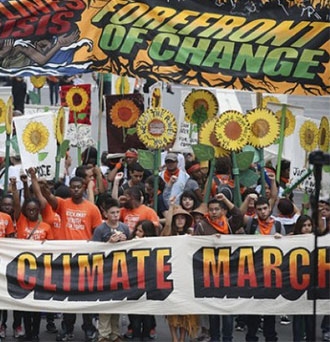
The catastrophic floods, droughts, and wildfires of 2017 brought climate change home to Americans like never before. And, while Mother Nature may not have planned it this way, the extreme weather hit 2018 political battleground states especially hard, with Florida, Arizona, Nevada, and California facing unprecedented damage.
In each of these states, 2018 will bring both a U.S. Senate and a gubernatorial election; combined, they also have 20 competitive U.S. House races. Voters anxious about climate change could thus hold the key to both the Senate and House this November, but only if campaigns can properly target them. Right now, that's a big "if."
The public's image of environmentalists is so far from the reality that it's the stuff of political satire: "Close your eyes and picture an environmentalist, and you're likely to summon up a white guy in a Patagonia jacket, standing proudly next to his Prius with camping equipment loaded in the back," scoff commentators at Quartz. This stereotype would be funny if it weren't so often swallowed hook, line, and sinker by political consultants and the media, leaving many true environmentalists to be ignored by candidates and campaigns alike.
A more accurate and nuanced picture reveals that environmentalists aren't nearly as white, rich, or uniformly young as we're often led to believe. In fact, nearly every racial minority group tends to care more about environmental issues than white people do. A growing body of research, most notably from the Yale Program on Climate Change Communications, shows that Latinos are particularly concerned about climate change, and that they're also more likely to get involved in climate-related campaigns.
These findings align with our research at the Environmental Voter Project, where we typically poll over 10,000 people per state. We ask about voters' political priorities, and then cross-reference their responses with consumer and behavioral data to build predictive models that individually identify "environmental voters," similar to how insurance companies build actuarial tables.
In every state where we've measured voter priorities, we've found that Latinos, Asians, and African-Americans are significantly more likely than Caucasians to prioritize climate change and then environment. In Florida, African-Americans make up nearly 14% of the electorate and are 18.4% more likely than white voters to list climate change/environment as a top priority. In Nevada, where almost 1 in 5 voters is Latino, they are 10.3% more likely than white voters to care about the environment.
The "wealthy environmentalist" stereotype also breaks down under scrutiny. A 2015 Pew Research Center Study found that 49% of Americans making less than $50,000 believed that climate change was a "very serious problem," whereas only 41% of those making more than $50,000 agreed. This difference likely reflects the very real concern than climate change disproportionately impacts poorer communities. The same survey found that Americans earning less than $50,000 were almost twice as likely as their wealthier counterparts to think that climate change would harm them personally.
Finally, young people do tend to care deeply about climate change and the environment; here, the stereotype holds true. Yet a closer look reveals a more interesting picture. Environmental Voter Project research shows that 18-34 year olds are twice as likely to care deeply about climate change/environment as older age groups. But within the 18-34 year-old age group, those over 25 are twice as likely to prioritize climate change/environment as their 18 to 24-year-old peers.
We have also found surprisingly large populations of older Americans focused on climate change and the environment. Parents with 13-15 year-old children are just as likely as 18 to 24-year olds to care about climate change, and grandmothers between the ages of 55-65 aren't too far behind.
So what does all of this mean? Candidates who want to win in many 2018 battleground states should get real about who environmentalists are, find them, and get them to the polls.
Moreover, the environmental movement can no longer afford to treat inclusivity and intersectional organizing as convenient tactics or talking points. They are now absolutely necessary. Make no mistake: the environmental voters who could decide the 2018 midterms are just as likely to be Latina grandmothers as white college students. Candidates ignore them at their peril.
Nathaniel Stinnett is the Founder & Executive Director of the Environmental Voter Project, a non-profit focused on increasing turnout among environmental voters in local, state, and federal elections.
